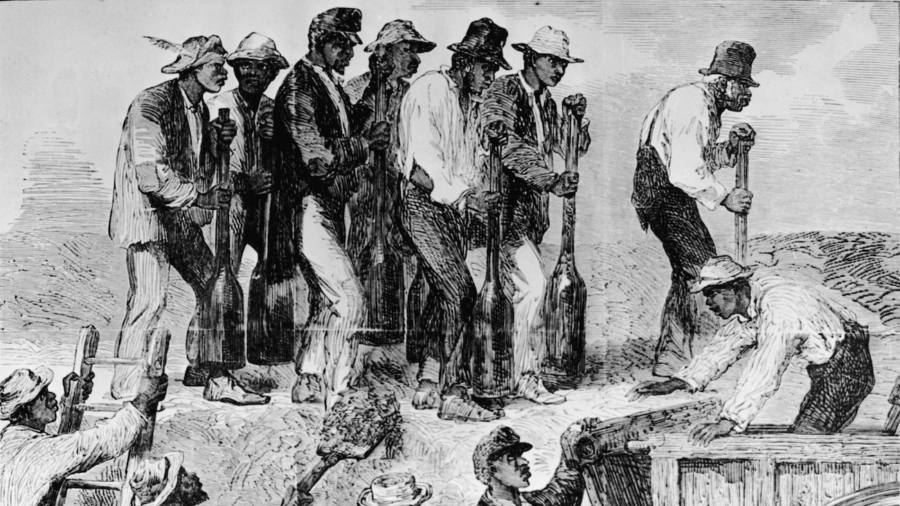The House of Representatives on Wednesday passed a bill making June 19—Juneteenth—a federal holiday to mark the end of slavery in the United States, sending the bill to President Joe Biden’s desk.
The measure, S. 475, passed on a vote of 415-14 in the chamber. It comes a day after it passed through the Senate with unanimous consent. The president is expected to sign the bill into law at a White House event on June 17 to make it the 11th federal holiday.
Under the legislation, the federal holiday would be known as Juneteenth National Independence Day.
Rep. Sheila Jackson Lee (D-Texas), who introduced a companion bill in the house in February applauded the passage of S. 475.
“Thanks to all who worked to make Juneteenth the living symbol of Lincoln’s promise that this nation, under God, ‘would have a new birth of freedom,'” she said on Twitter late Wednesday. In a separate statement, she said that Juneteenth “celebrates African American freedom while encouraging self-development and respect for all cultures.”
Rep. Carolyn Maloney (D-N.Y), chair of the Oversight Committee, spoke in favor of the bill in a House Floor speech: “Our federal holidays are purposely few in number and recognize the most important milestones in our country’s history. I cannot think of a more important milestone to commemorate than the end of slavery in the United States.”
Those who voted against the bill for various reasons, including objections to the naming of the holiday, were all Republicans. They were Reps. Andy Biggs (R-Ariz.), Mo Brooks (R-Ala.), Andrew Clyde (R-Ga.), Scott DesJarlais (R-Tenn.), Paul Gosar (R-Ariz.), Ronny Jackson (R-Texas), Doug LaMalfa (R-Calif.), Thomas Massie (R-Ky.), Tom McClintock (R-Calif.), Ralph Norman (R-S.C.), Mike Rogers (R-Ala.), Matt Rosendale (R_Mont.), Chip Roy (R-Texas) and Tom Tiffany (R-Wis.).
Rep. Rosendale said in a statement that the legislation “is an effort by the Left to create a day out of whole cloth to celebrate identity politics as part of its larger efforts to make Critical Race Theory the reigning ideology of our country.” He added, “Since I believe in treating everyone equally, regardless of race, and that we should be focused on what unites us rather than our differences, I will vote no.”
Rep. Roy in a statement said that he had issue with the term “Juneteenth National Independence Day” because it “needlessly divides our nation on a matter that should instead bring us together by creating a separate Independence Day based on the color of one’s skin.” He suggested the holiday be called “Juneteenth National Emancipation [or Freedom or otherwise] Day.”
“We asked Democrats to work with us on the floor to change the name to one that properly recognizes the importance of the day without creating a separate ‘Independence Day,’ however, Democrats refused,” Roy said. “As a country, we must stop dividing ourselves by race and unite in our common pursuit of the ideals set forth in our Declaration of Independence that all men are created equal.”
Rep. Massie delivered a similar argument during the House floor debate of the bill.

Juneteenth, a portmanteau of June 19, marks the day in 1865 when Union troops arrived in Galveston, Texas, to relay news of the end of the Civil War and of the Emancipation Proclamation, which officially outlawed slavery.
The proclamation to free all slaves in the southern states was signed two and a half years prior, in 1862, by then-president Abraham Lincoln, and came into effect at the start of 1863 during the American Civil War. Confederate soldiers later surrendered in April 1865, marking the end of the four-year-long war.
But slavery remained relatively unaffected in Texas due to a lack of Union troops to enforce the order—until Juneteenth, when Texas became the last southern state to have the proclamation enforced.
Texas officially declared Juneteenth a state holiday in 1980. Since then, the holiday has been officially recognized in most U.S. states.
From The Epoch Times

